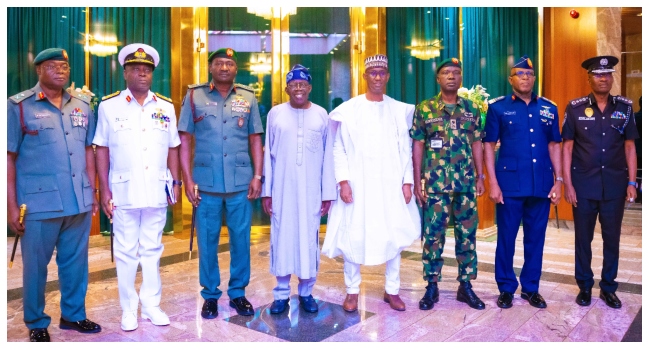President Bola Tinubu has formally asked the House of Representatives to confirm the newly appointed service chiefs.
The Speaker of the House, Abass Tajudeen opened Thursday plenary by reading the President’s letter seeking the confirmation of the appointments of the heads of security agencies.
On June 19, 2023, exactly three weeks after his inauguration, Tinubu removed all service chiefs in Nigeria and appointed new ones whom he directed to resume with immediate effect.
Those affected in the unprecedented shakeup include Alkali Usman who was removed as the Inspector-General of Police (IGP), Lucky Irabor, sacked as the Chief of Defence Staff; Faruk Yahaya, retired as the Chief of Army Staff; Awwal Gambo, removed as the Chief of Naval Staff; and Isiaka Amao, retired as Chief of Air Staff.
The President subsequently appointed new service chiefs in the country and named a former Chairman of the Economic and Financial Crimes Commission (EFCC), Nuhu Ribadu, as his new National Security Adviser (NSA). Ribadu replaces Babagana Monguno as the nation’s NSA.
Tinubu also appointed Adeniyi Adewale as the Acting Comptroller General of Customs.
All the new appointees have since resumed in acting capacity awaiting the confirmation by the National Assembly.
The move by the President followed persistent calls by civil society organisations that the security architecture be rejigged and fresh hands allowed to handle the nation’s security apparatus.
Between May 2015 and May 2023, verifiable data showed that over 55,000 Nigerians were killed by terrorists, bandits, and armed gangs during the administration of immediate past President Muhammadu Buhari. The former military head of state was criticised by many over the alarming killings in the country under his watch.
During his inauguration speech, Tinubu, who took over from Buhari, his fellow party man on May 29, 2023, promised to “defend the nation from terror and all forms of criminality that threaten the peace and stability of our country”, adding that “to effectively tackle this menace, we shall reform both our security doctrine and its architecture”.



